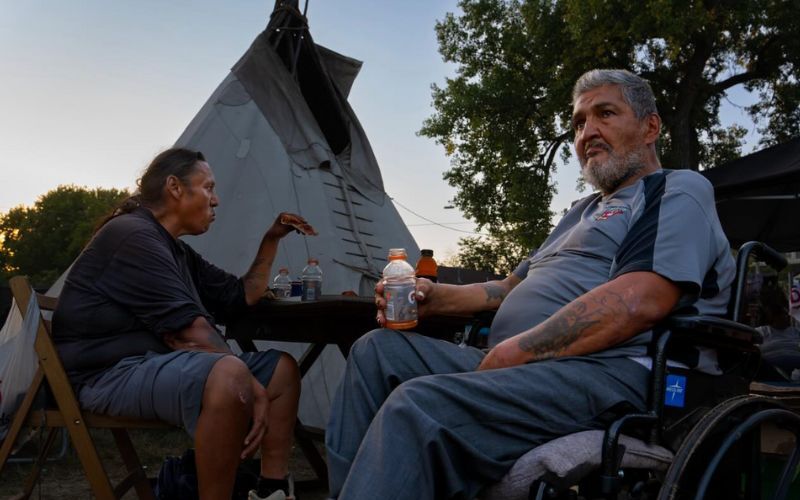Nearly 150 people were evicted earlier this month from Camp Nenookaasi, a community-based healing camp in Minneapolis rooted in Native practices where people experiencing homelessness can find stable interim shelter.
The camp has occupied a vacant city lot in the East Phillips neighborhood of Minneapolis since August 2023, but residents began folding tents and gathering belongings after Mayor Jacob Frey scheduled the eviction and destruction of the camp on January 4.
Plans to close the camp in December were postponed. On January 2, residents of Camp Nenookaasi filed a lawsuit against Frey in an attempt to halt the eviction process, but a federal judge denied their request, allowing the city to move forward.
Insulated tents, yurts, teepees, and other shelters have been removed, as well as the camp's ceremonial fire and other sacred sites. Residents were left to face the deadly Minnesota winter weather, where temperatures have reached negative levels this past week, according to the Weather Channel.
Camp Nenookaasi (Hummingbird) has served as a crucial stepping stone to housing stability and sobriety while providing food, warmth, shelter, and cultural healing for its residents, who are mainly Indigenous. Since its inception, nearly 76 residents have been able to obtain long-term or permanent housing.
“The camp is a creation of social safety and a real meaningful community,” Camp Nenookaasi organizer Christina Crabtree, told Native News Online. “That sense of safety is what lays down the foundation for people to start to heal traumas and start seeing that they are worthy of care, housing, recovery, and healing. We have stayed together.”
American Indian/Alaska Natives experience the second highest rate of homelessness in the U.S., according to the latest Annual Homelessness Assessment Report by the National Alliance to End Homelessness. As of 2019, AI/AN people account for approximately 1.5% of North America’s population, yet they make up more than 10% of the homeless population nationally, according to the HUD report.
Nearly 80% of Native people no longer live on reservations, and little funding is directed specifically toward them. Tribal governments usually allocate the funds they do get for life on the reservation, as required by the federal government.
City officials said a number of services will be offered to displaced residents of Camp Nenookaasi, including storage, shelter, mental health resources, and health care as an incentive to leave. After unfilled promises, residents who hadn’t gotten the help they were promised simply moved to a new encampment a few blocks away according to FOX9.
Frey campaigned for mayoral office on a promise to end homelessness before being sworn into office on January 2, 2018. Frey has implemented policies and initiatives to drastically increase sweeps and evictions of homeless encampments, using authority over the Minneapolis Police Department to displace people and offer little support for evicted residents,the January 2 lawsuit.
Back in 2018, the Wall of Forgotten Natives, a homeless encampment along the highway sound barrier that separates Hiawatha Avenue from East Phillips, was shut down. Frey's office worked with local non-profits, the Red Lake Nation to transition 175 residents from the camp to temporary shelters.
In 2020, Powderhorn Park encampment was formed due to the increasing need for access to treatment and housing services. Frey opposed the encampment and residents were evicted and the camp destroyed along with personal belongings thrown into dumpsters according to the lawsuit.
Crabtree says that clearing Camp Nenookaasi will scatter unhoused people throughout the city, making it more difficult for them to meet with housing workers and receive community resources. She also notes that unhoused people are more likely to experience violence.
“There have been so many encampment evictions week after week. There are people who don’t have these residents' best interests in mind,” Crabtree said. “People are predatory who know where the camps are and when an eviction happens and residents are in that place of hopelessness, they can easily be taken advantage of. We see people even go missing after encampment evictions.”
In the meantime city council members, camp organizers, and members of the Red Lake Nation are partnering together to create a cultural healing center to help support and house people. Native News Online reached out to Red Lake Nation but did not receive a response at press time.
“There are so many different ideas about solutions, but the majority of the time these organizations that want to help are so underfunded and competing for the same resources. We need to all realize that people are suffering and as long as we stay divided, we are going to stay stuck in this cycle,” Crabtree said.
read more: https://nativenewsonline.net/currents/unhoused-relatives



Can't even be homeless anymore without fear of eviction